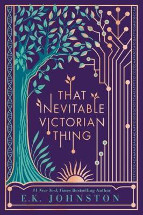That inevitable Victorian thing by E.K. Johnston

Dutton Books for Young Readers, 2017. ISBN 9780735231597
(Age: 15+) Recommended. Themes: Fantasy. Alternative British Empire,
Diversity, Romance, Duty. Genetics. Readers will find themselves in
a very different political and scientific world when they encounter
Victoria-Margaret, a direct descendant of Queen Victoria who has
travelled incognito to Toronto to be presented as a debutante at her
cousin's ball. She is excited to have the opportunity to shed the
trappings of royalty and meet people as a normal young woman.
Helena, too has been invited to the debutante ball. She is the
daughter of a pre-eminent geneticist, and as her mother's daughter
must present a happy face even when uncertain in the social whirl of
tea parties and dances. August Callaghan is also in Toronto for the
ball and is overjoyed to be meeting Helena again, hoping to cement
their childhood attachment, even though he is frantic about the bad
decisions he has made about his family's shipping empire which is
under siege from pirates. The three discover an unusual bond, which
will fascinate the reader.
E.K. Johnston is an author who is not afraid to take risks and write
very original and thought provoking books. Her first book, The
Story of Owen : dragon slayer of Trondheim (2015 YALSA Best
Fiction for Young Adults (Top Ten), 2015 William C. Morris YA Debut
Award Nominee) grabbed my attention and I have followed this author
with interest since then. Her story of an empire that has been built
on making diverse genetic royal marriages instead of the princes and
princesses marrying white royalty from Europe is unique and raises
lots of questions about what the world would be like now if Queen
Victoria has made those decisions. Throughout the book are snippets
of conversations that Victoria-Margaret has on the net with the
partner that has been chosen for her as genetically compatible and
Helena too finds a partner who suits her genetic profile.
This is a novel that will challenge readers as they follow the well
described characters of Margaret, Helena and August who must make
some difficult decisions about their sexual orientation and duty as
they come of age.
Pat Pledger